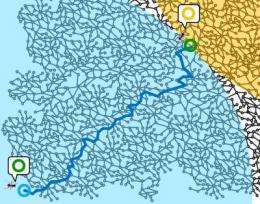A search engine for social networks based on the behavior of ants

Research at Carlos III University in Madrid is developing an algorithm, based on ants' behavior when they are searching for food, which accelerates the search for relationships among elements that are present in social networks.
One of the main technical questions in the field of social networks, whose use is becoming more and more generalized, consists in locating the chain of reference that leads from one person to another, from one node to another. The greatest challenges that are presented in this area is the enormous size of these networks and the fact that the response must be rapid, given that the final user expects results in the shortest time possible. In order to find a solution to this problem, these researchers from UC3M have developed an algorithm SoSACO, which accelerates the search for routes between two nodes that belong to a graph that represents a social network.
The way SoSACO works was inspired by behavior that has been perfected over thousands of years by one of the most disciplined insects on the planet when they search for food. In general, the algorithms used by colonies of ants imitate how they are capable of finding the path between the anthill and the source of food by secreting and following a chemical trail, called a pheromone, which is deposited on the ground. "In this study – the authors explain – other scented trails are also included so that the ants can follow both the pheromone as well as the scent of the food, which allows them to find the food source much more quickly". The main results of this research, which was carried out by Jessica Rivero in UC3M's Laboratorio de Bases de Datos Avanzadas (The Advanced Data Bases Laboratory - LABDA) as part of her doctoral thesis, are summarized in a scientific article published in the journal Applied Intelligence. "The early results show that the application of this algorithm to real social networks obtains an optimal response in a very short time (tens of milliseconds)", Jessica Rivero states.
Multiple applications
Thanks to this new search algorithm, the system can find these routes more easily, and without modifying the structure of graph (an image that uses nodes and links to represents the relationships among a set of elements). "This advance allows us to solve many problems that we find in the real world, because the scenarios in which they occur can be modeled by a graph", the researchers explain. Thus, it could be applied in many different scenarios, such as to improve locating routes in FPS systems or in on-line games, to plan deliveries for freight trucks, to know if two words are somehow related or to simply know exactly which affinities two Facebook or Twitter users, for example, have in common.
More information: APPLIED INTELLIGENCE Volume: 36 Issue: 4 Pages: 899-917 Published: JUN 2012 ISSN: 0924-669X
Provided by Carlos III University of Madrid



















